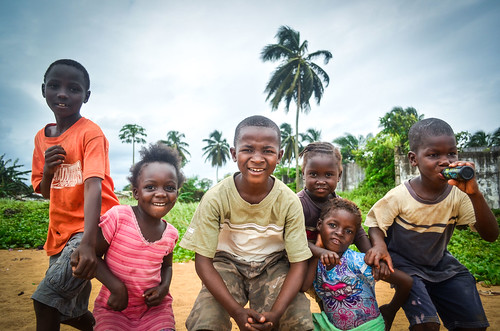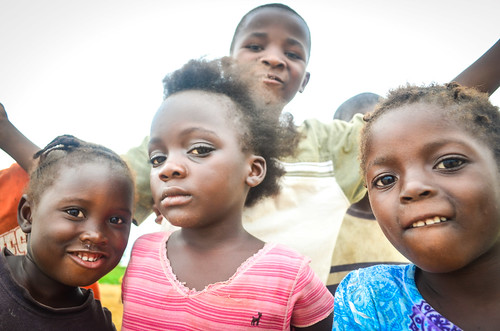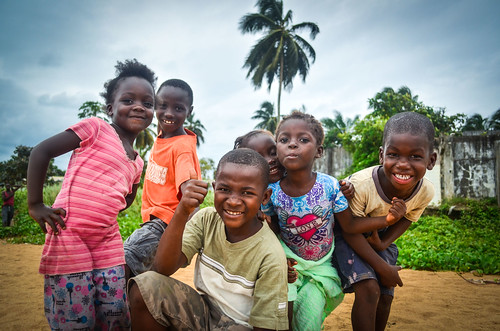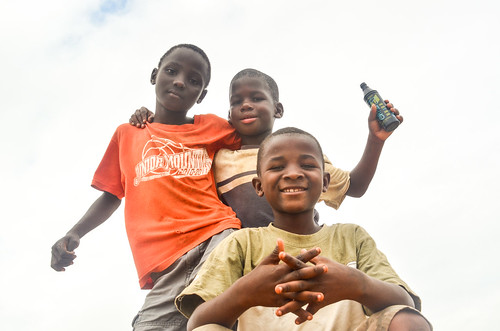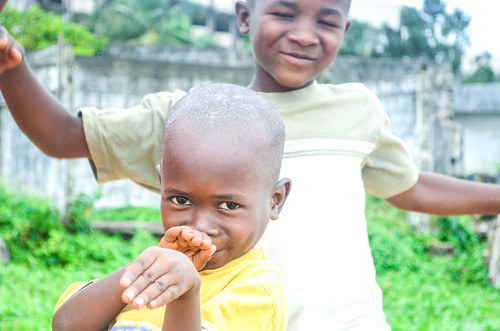We stayed for the weekend at the convent in Monrovia, to rest after our adventures in the bush between Freetown and the Liberian capital. Katie and Guillaume took me to the July 14th celebration at the French ambassador’s residence. I was excited to switch from a gastronomical world made of rice and kassava leaves to French cheese and charcuterie. As soon as the speeches ended, the guests, looking like possessed by primal spirits, jumped on the buffet and assaulted the food. There was no more than a kilogram of comté to divide among more than a hundred of invitees. And only a plastic spoon to cut it, not even a knife. That was hideous, but it didn’t bother the people, who remained stylish only for their suit (especially compared to me). They started to behave only when the MC passed the instructions through the mic on how to serve oneself in turn and let the others do so. In the end, it was very far from being a fancy or classy reception, but I don’t need more to make my evening.

One of the causes of this rush on good food could be cost of living in Monrovia. Not only the accommodation is extremely pricey, the food as well. The many supermarkets offer everything: from brie, roquefort, camembert, fois gras, down to american peanut butter, corn flakes, marmite™, … (and my favorite Chips Ahoy cookies), everything that we expect to find in a European or American supermarket. One has to look very hard in order to find a local product (despite so many peanut fields in the region). Everything is imported. Everything is roughly twice the price. And so many things make no sense, like cookies made in India or the fresh juices coming from Turkey. Two boxes of 50g of coffee cost less than than same in a 100g box. Well, it probably makes sense if we dig into it. The only large businesses seem to be Lebanese importers. It apparently costs more (or it is simply impossible) to fish, package, and distribute a Liberian fresh fish in Monrovia supermarkets than to send it to Europe.
The positive is that it feels like back at home. The negative is that it is all labelled in US dollars and it adds up so quickly. I don’t understand how can locals survive in here. Even on the streets, the plates of rice, the batteries, the electronics, the cookies, … every product costs much more than “it should”. Same for bananas and corn. Everyone talk in US dollars. On the other hand, Liberia ranks among the 5 lowest GDP per capita.

The Masonic Temple, next to Hotel Ducor on the Monrovia’s central hill, is one of the landmarks of the city. The Masonic lodge of Liberia was founded in 1867, after the Freemasonry model present in the USA. It was restricted to Americo-Liberians and gathered most of Liberia’s high-ranking officials. As a result, it symbolized the monopoly that was targeted and destroyed by the coup of Samuel Doe in 1980. It is a miracle that the building is still relatively well conserved, after having been the theater of battles and squatted when the war ended (photo of 1967).
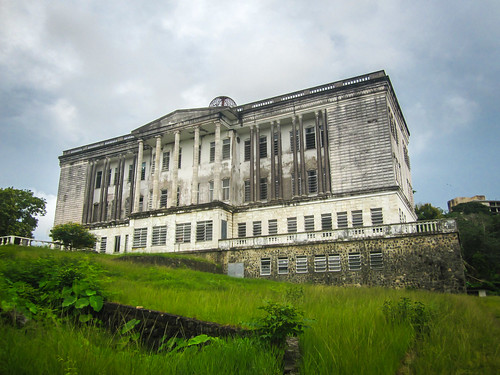

While walking in town, I was called several times “Hey Nigga!” or “Wassup Nigga?“. The first times I could not answer anything. What am I supposed to answer to this? I don’t know if it’s a joke or a proud use of the lovely American culture. Liberia and the USA are brother countries, as many like to think.
I don’t recall all the names I have been called. Apart from everything related to being White, I am most of the times “Jesus!“, but it can also be “Rastaman” or “Arab”.
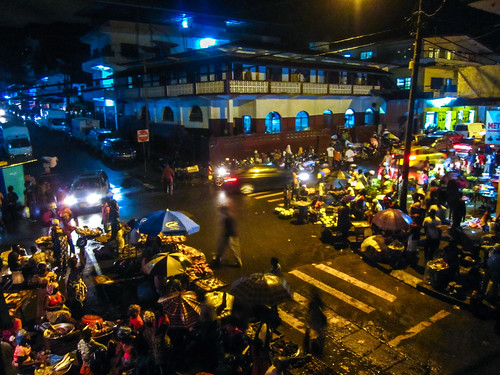
On Sunday, the town is dead. The bustling streets are deserted. The restaurants with WiFi are closed and we have hard time finding an internet café that works. They charge 100 LD per hour for using their annoying desktop machines and 150 LD (2 USD) for browsing from a personal laptop. And it cannot even load Gmail HTML. We finally end up in the posh hotels of Mamba Point to use their WiFi. The first one doesn’t give the WiFi password for orders below 10 USD. At the other one, we have to discuss hard to have them remove the extra 5 USD charge per laptop. Even with those prices, the connection is very slow and I couldn’t upload any picture.

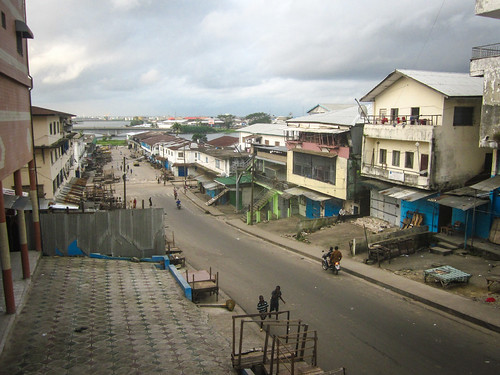
One of our first tasks is to visit the Immigration Bureau of Monrovia to correct or extend our visa. We both have a 90-day visa that has been stamped as “15 days” at the Bo border. The officer there said that he couldn’t make a longer stamp, and that the extension was free in Monrovia. This sounds wrong as we met a traveler who was stamped “30 days” at the same border post.
The entrance to the Immigration Bureau is a narrow staircase hidden behind small shops or houses in decay. A welcoming officer first asks for small bills in order to put our request on the top of the stack so that it gets processed faster. We don’t give anything, and since the office is full of people doing nothing, we immediately move on to the next level.
The next level is a discussion in a room where big ladies are eating and reading the news. They want 20 USD to extend our stay. We don’t understand anymore why we paid our visa the big price in the first place. Every immigration officer has a different way to interpret a visa and a different way to find a solution. Anyway, those women cannot do anything since we have to first consume our 15 days before requesting the next 60 days. They say we can make the extension in any other city of Liberia, while we heard from other sources that it is possible only in Monrovia. As usual, in the end, we end up more confused than sorted out.
Those immigration officers can be seen roaming and idling around their office in Broad street. One of them undercover controlled me while I was shopping in the waterside market. I had made the mistake to go out without my papers. He refused my suggestions of solutions and jumped on the opportunity to ask for 100 L$ to “open his own business”. The conversation went on until I started walking away while he following me, lowering his price. It soon looked just like any bumster making up nonsense stories to get money, until he disappeared. That is pathetic for an civil servant paid to enforce the law, but what if the ID he showed to me was an old or a fake one? There is no truth, no righteousness, no unquestionable rule anyway. It is a social jungle where the street-smartest win.
By the way, Monrovia is not only one of the rainiest capital in Africa (with Freetown), it is also ranked as one of the most corrupt places in the world (sharing the podium once again with Sierra Leone). According to Transparency International (report), more than 75% of Liberians and Sierra Leoneans report having paid a bribe in the past year.
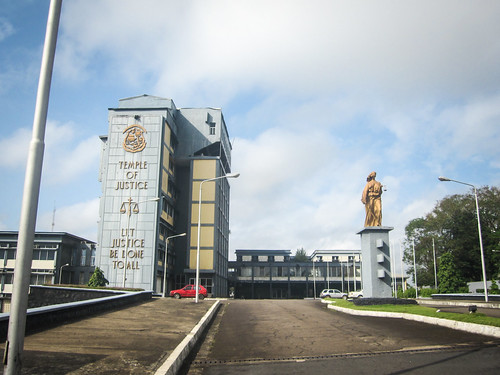
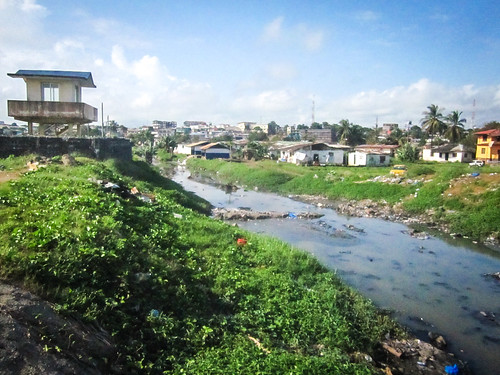
I had written previously about the countries of West Africa disconnected from the high speed internet, saying that after Senegal, the next country with decent internet would be Ivory Coast. The truth is that the optic cable of the ACE link is already connected to Monrovia since early 2013. Why is internet still so slow then? Six months following the landing of the submarine cable into the capital, “they” are still not working on the local cabling. Which means that the only way to enjoy the high speed is through the 4G network of the cellphone operators.
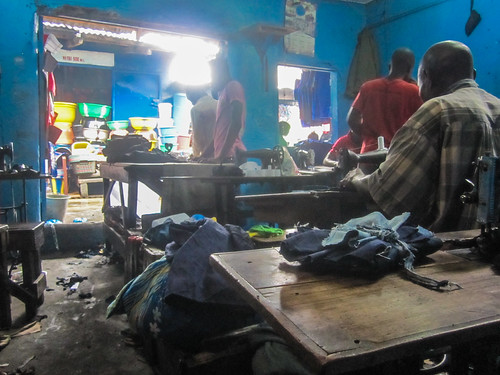
I didn’t think this 4G would be as good as it actually is, until I tried it at Lisa’s place. Gmail and Youtube work. I could upload all my pictures since Guinea-Bissau and spend (way too much) time catching up with blogging. However, this speed comes with a price, starting at 80 USD for 12 GB to 200 USD for 100 GB (to be used within 30 days). This is already 4 times more data for the same price than it used to be, but it remains a luxury service.
Lisa works at the Embassy of Sweden and she kindly hosted us in Monrovia (or should I say, saved our lives, as the city is quite unfriendly for travelers) because Henrik, met while working in South Africa, was on vacation when we arrived. Sweden is the biggest donor in Liberia after the USA. It is also the largest European Embassy here, while many of the Embassies are actually small offices coordinated from Ivory Coast. We rediscovered the comfort of a good bed and a good shower (that comes from above our head and not from a bucket, and with hot water! We didn’t have that since … a very long time ago). We enjoyed the fun and the care of the very helpful Swedish crew. Besides discovering that the names of Mickey, Minnie (and even Batman!) are translated in Swedish, we learnt how to play Kubb on the beach. Karaoke, bars, beach, dinners, etc, in between our resting, photo processing and writing days, made time fly during our stay in Monrovia.
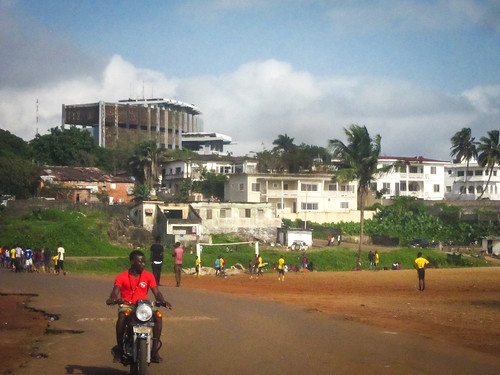
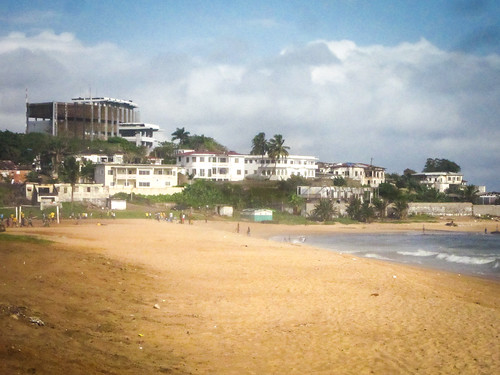
The last days of cycling between Sierra Leone and Freetown have been wet and muddy. It has been a good cycling (and swimming) experience, but bad times for my brake pads, always working among particles of red mud. I could feel my brakes weaker and weaker day after day.
While in Dakar, I got supplies and spares for everything on my bike, except for the brake pads. I received the wrong type. I need the standard Magura pads, which are already hard to bump into by chance in Europe, let alone in Africa. For this kind of gear, one need to have at least spares and spares for the spares. DHL would take 100 USD for the delivery of a small package to Africa, and this is after figuring out how to get them and who will send them over. The mistake in Dakar, together with the wet and muddy terrain, that seems to make them wear very quickly, was worrying me. I tend to over-worry in advance to compensate with the problems and bad surprises that over-happen in Africa. As a result, I had set myself not to leave Monrovia before having new ones.
The first evening of our move to Lisa’s place, a Monday, Per paid a visit to our bikes and saw the brakes. Per is a cyclist who, on the same evening, posted in a Swedish bike forum about the brake pads. He got a quasi-instant reply from someone having unused ones in Stockholm, had them fetched and handed over to his wife Kristina, who was due to fly back from Sweden to Liberia. She flew on Wednesday and the pads were in Monrovia on Thursday.
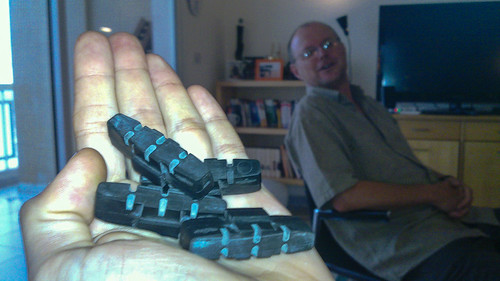
What are the odds of getting Magura pads in Monrovia in 3 days? I would never have imagined it and was prepared to spend lots of time, efforts and money, to find a solution. Each of the events that happened on the “supply chain” were lucky. The combination of all of them is the embodiment of an incredible luck, largely built on Per’s attention and rapidity of action.
That makes me write here a quote by the mountaineer W.H. Murray, that I also copied on my “thank-you” postcards I give as a souvenir to people I meet on my way:
“Until one is committed, there is hesitancy, the chance to draw back, always ineffectiveness. Concerning all acts of initiative and creation, there is one elementary truth the ignorance of which kills countless ideas and splendid plans: that the moment one definitely commits oneself, then providence moves too. All sorts of things occur to help one that would never otherwise have occurred. A whole stream of events issues from the decision, raising in one’s favor all manner of unforeseen incidents, meetings and material assistance which no man could have dreamed would have come his way.”


The malaria rapid tests I had bought in Dakar came in useful for Johannes: one morning, in the doubt, he made one turn positive. We know that we can catch it easily since we don’t take preventive treatment and we are sleeping/camping outside. Things went fine after 3 days and 24 Coartem pills. This is a cheap (7 € for a treatment box) medicine available commonly in Africa that works well, although Kristina warned us that some forms of malaria could be already resistant to it. Malarone/Malanil remains the best choice, but at the price of 50 € for the treatment (Malarone can be used not only for the prophylaxis (1 pill / day) but also as a cure in case of malaria attack (12 pills over 3 days)). I still have Doxycycline pills that I take once in a while, maybe it helped in me not getting malaria yet.
She also advised us about other medicines. All travel guides and clinics would agree on the fact that the local water is unsafe for drinking in most of the African countries. Even in Morocco, where I had no problem with it. I am equipped for treating the water before drinking, but since the Moroccan tap water has been safe to drink, I didn’t use it. And I didn’t use it either in the following countries. Maybe my stomach developed a resistance along the way, because I have not been sick yet, after liters and liters of tap water and pump water from Senegal to Liberia. The water from the pumps has always been rather good, except once in Liberia where it smelled and tasted like rotten something. It tastes better than the widely available “purified” water that comes in plastic bags.
So, according to the various travel advice, my stomach must be a jungle of life forms, parasites and other disgusting stuff. Just in case, I take a pill of albendazole to clean my guts from those cute worms that appear on the box illustration.
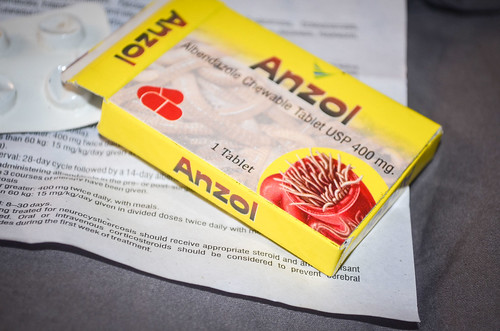
Monrovia and its 1 million inhabitants are powered by diesel generators. It used to be supplied by the Mount Coffee 64 MW dam upstream, but the hydropower plant is not working since the civil war started. Nowadays, documents about the diesel generators suggest think that the total electricity generation capacity of Liberia doesn’t exceed 15 MW. I have seen a plant and a “7 x 1000 kW” sign on Bushrod island. It is hard to evaluate the power production and consumption since the private compounds and stores have their own generators.
The worst is that, despite the rain and the coal resources of Liberia, the electricity is generated from diesel. The price is 325 L$ per gallon (0.90 € / liter), much cheaper than Europe and slightly above USA, but still resulting in crazy electricity prices. The houses are equipped with prepayment meters that require advance payment. It works like credit in a prepaid cellphone. The shopkeeper of a small shop selling drinks and cookies tells us that 50 USD would last 3 weeks, eaten by the fridge, a TV and a bit of air conditioning. This is once again completely disconnected with the average income of Liberians.
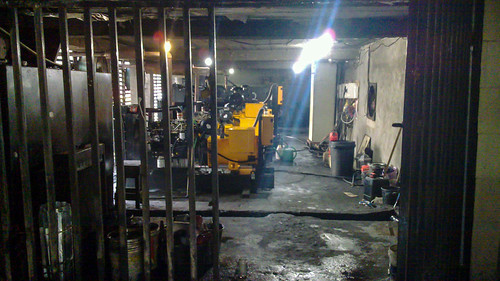
Near Mamba Point, the American Embassy is situated in a prime location. Many gigantic and good looking buildings are all part of it. Naturally photos are not allowed, but they are on the other side of the road.

West Point is the poorest neighborhood of Monrovia. It is said to have 25’000 or 75’000 people living there. I have not been there, but I could see the slums from the top of Hotel Ducor. Hotel Ducor is the emblematic hotel in ruins at the center of Monrovia that offers the best views of the city.
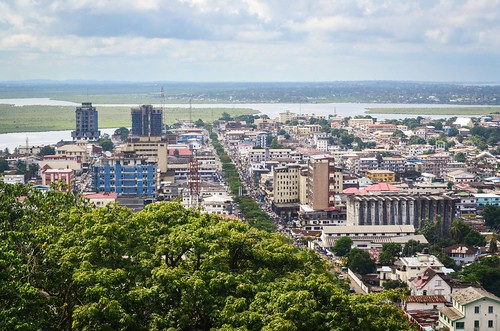
Panorama from Hotel Ducor’s rooftop

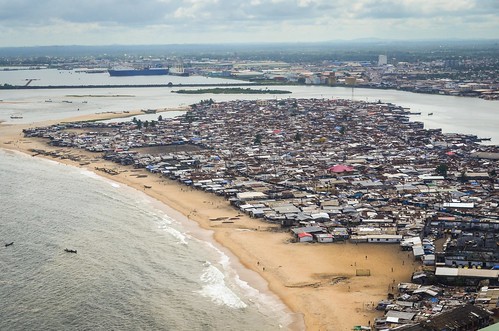
For those who don’t mind tough stories, here is one article which deals not only about West Point, but especially about the current life of women who were child soldiers during the Liberan civil wars.
Also hidden between the buildings of the American Embassy lies the mysterious Embassy of the Vatican City, called Apostolic Nunciature. I didn’t imagine that the Vatican has embassies abroad to represent the 572 Vatican citizens, but they have actually 112 of them!
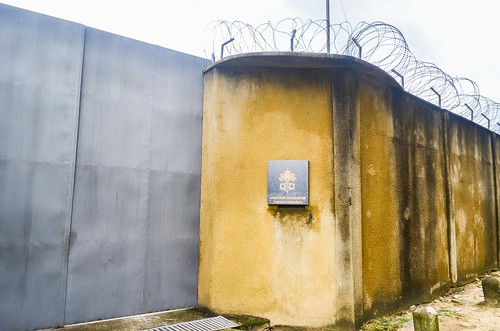
In Sinkor, where the Embassies and large expats compounds reduce the Europe-Africa gap to a simple iron gate and barbed wire fences, the FIFA World Player of the Year 1995 and candidate for presidency George Weah has a modest house.
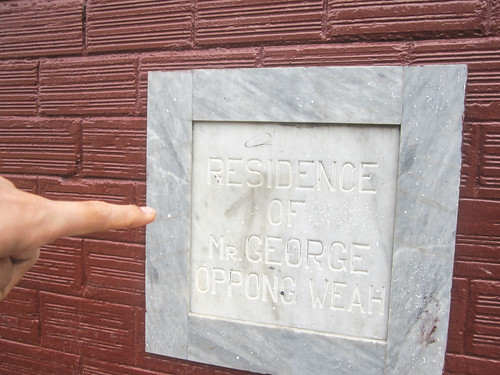
Not far from him, the director of the Alliance Francaise is a former FIFA international referee.
Johannes tells me something about cycling Africa that I would never have thought: we are currently closer to Brazil than to France and to South Africa. Recife is roughly 3000 km from Monrovia. The latitudes of Zürich, Monrovia and Cape Town being respectively 47.3°N, 6.3°N, 34.0°S, I have just passed the “halfway point in terms of latitude”, if it means anything.
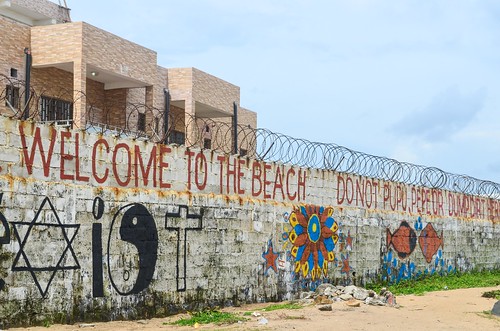
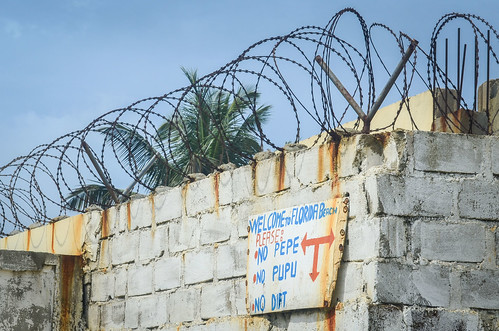
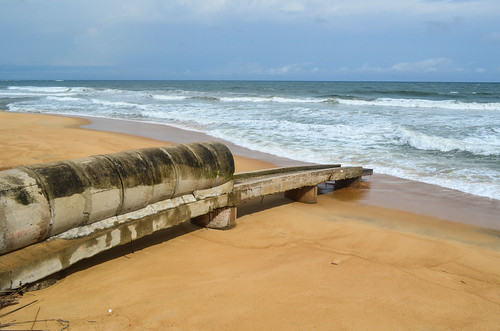
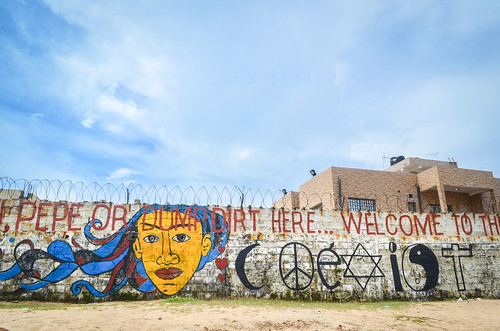
Like in Freetown, it seems at first that all cars except the taxis are 4×4. It also seems that half of those 4×4 are tagged with the letters “UN” or with a logo of another United Nations organization.
And thanks again to Lisa, we are put in touch with the UN working at the Liberian borders with Ivory Coast. This border is dangerous, because while the military forces under the president Ouattara control Ivory Coast, the pro-Gbagbo rebels hide in Liberia. We are confirmed that the border crossing in the north (Saniquellie – Logwato – Danané) is safe now. It is where Wang was caught in the lines of fire earlier this year. There are two other border posts to Ivory Coast, one in Bhai Miko to Touleupleu, currently not recommended for the tense atmosphere, and the coastal one near Harper over the Cavalla river, also safe.
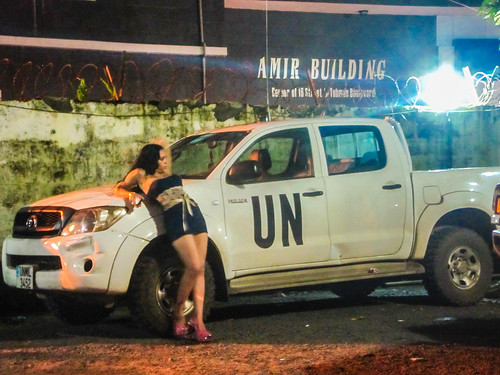
Since we are staying for a couple of days in Monrovia, it is wise to make a mini visa run, for Ghana and Nigeria The later one is supposedly hard to get. Even for Ghana, we were told that their Embassy in Monrovia only delivers visa to residents of Liberia. But when we went there on Monday, the man seemed to understand our specific journey. He asked for more proofs and we could submit our application on Tuesday. We got the Ghanaian visa on Friday, to be used within 3 months and valid for a 1-month stay. Perfect.
After this positive experience, we visited the Nigerian Embassy in Congo Town, the eastern extension of Monrovia, to evaluate how difficult the visa application really is. The good fortune stroked again: we picked a taxi whose driver has a brother working as … the ambassador of Liberia in Nigeria, and who could support us (but he didn’t pick up the phone at that time). At the Embassy, once again, the initial tough requirements (proof of residency in the country of the Embassy, letters of invitation, reservation of accommodation, flight tickets, etc) vanished when we managed to talk to one boss instead of the secretary. However, Nigeria is still far away and getting a 3-month valid visa in Monrovia would make us stress and rush to the border. We will have to apply from Togo or Bénin.

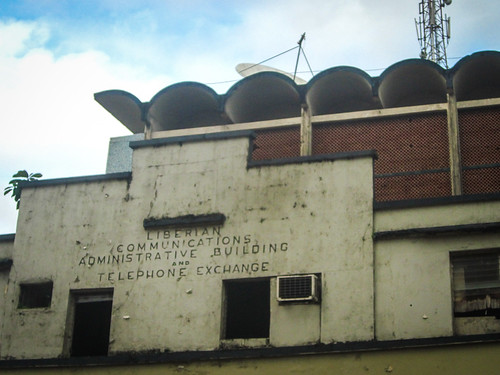

The two buildings behind the winner cabin are the E.J. Roye building and the National Bank. They can be easily identified on Monrovia’s panorama, and would probably be the tallest buildings if there was no Ducor hotel perched on its hill. The E.J. Roye building used to be the headquarters of the former True Whig Party, which was the party of most of the Americo-Liberians, who were making almost 100% of the people allowed to vote (but less than 5% of the Liberia’s population). Now the party doesn’t really exist anymore, the building is in ruins and not even squatted. A caretaker told us it is possible to go to the top, but the man-with-the-key was away at the moment we passed by. The National Bank building was apparently not even completed when the war broke out. It is currently being worked on.
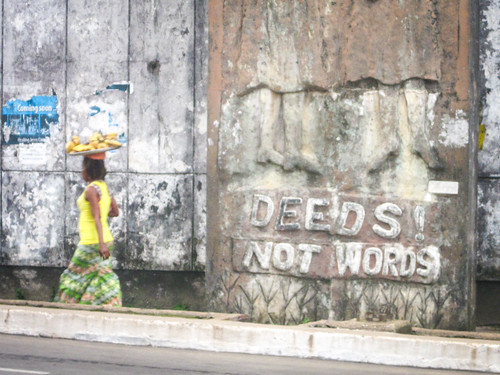
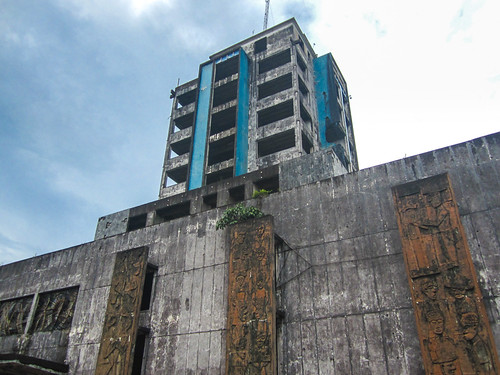
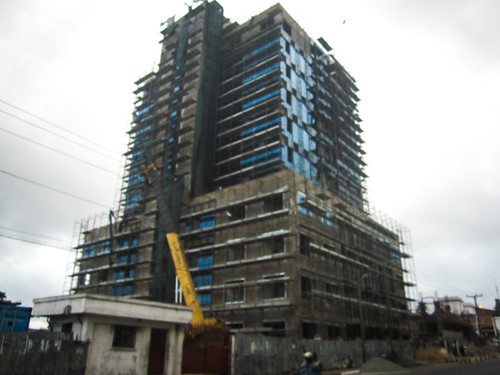
Monrovia is a cemetery of impressive buildings abandoned in the middle of the city center.
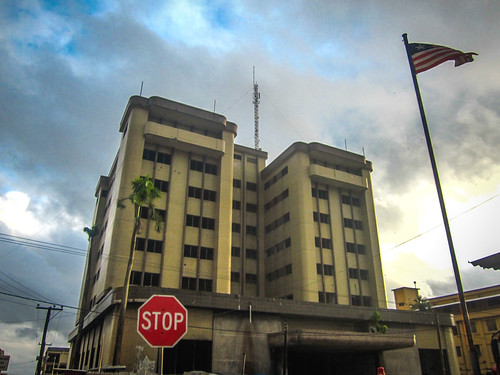
I will end this post with kids. On a last trip to the ruins of Hotel Africa, not far from Monrovia after Bushrod Island, we rested on the beach by the Hotel Africa village. Kids waved at me from afar, and I went closer.

When walking closer, I realized they were waving at me while group-pooping on the beach. It didn’t disturb them so much: they just pulled their pants up and requested a photo shoot. Some were not half my size but already posing like stars. Incidentally, walking on a dirt path watching carefully for little human poops reminded me of India.

